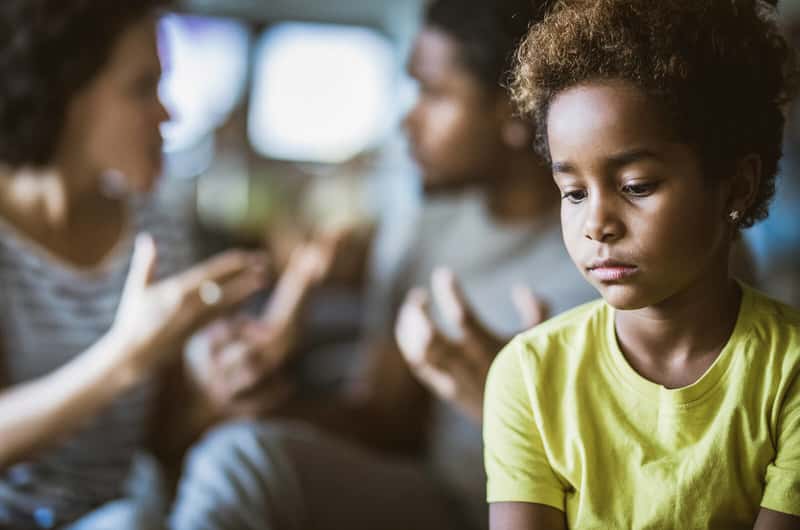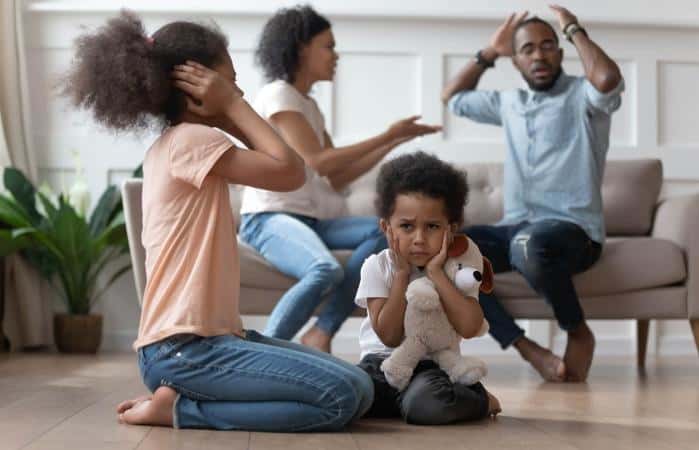
Sad girl listening to her parents arguing. [Courtesy]
Divorce is the legal termination of marriage. And if reports are to be believed, divorces are more commonplace now than ever before. Usually, it begins with a separation, then the divorce settlement follows, where custody battle and agreements involving children start. When going through a divorce, the two parents involved -- their feelings, attitudes, behaviour and the consequent story line -- can affect the mental health of the child for better or worse.
Where do I come in as a psychologist? Well, I get to see the negative effects of divorce on the young minds. I will tell you about parental alienation. Parental alienation can be understood as the manipulation of a child’s mind during or after a divorce. This is often done by one parent, and it leads to a child to developing a dislike or even becoming aggressive or confrontational towards the other parent.
This can be done in three ways
The most common is where one parent paints in the mind of the child a depiction that the other parent is a bad father or a bad mother.
There are other cases in which one parent blames the child for the divorce like say, “if you were a boy, your father wouldn’t have left” or some other reason.
Also, one parent constantly criticising a child’s appearance because they look like the other parent.

Courtesy
All these affects the child’s interaction, recognition, expression and identity of their self in their relationship towards one parent. It can also affect the child’s experiences in understanding the emotions of others (eg family, peers, teachers and the community). Usually, following a divorce, children will act out and become more aggressive than usual. Granted, their world has been turned upside down, and they have lost some of the security they had, and it is a little tough for them to process their emotions.
How Subtle Estrangement affects a child’s future relationships
This is where one parent is continually disrespecting the other in the presence of the children. In my practice, I have commonly heard dads being painted as ‘deadbeats’ or mums as ‘prostitutes’. Warranted or not, these words should not be used in the presence of a child by a parent to refer to the other parent.
Eventually, the child will be convinced that the other parent deserves to be belittled. This conditioning can follow the child/children up to adolescence or young adulthood. The effect can damage the relationship between a parent and their child and will cause the child/children to develop trust issues in other relationships. How can they trust someone when their own mum/dad was that bad a person?
Realistic Estrangement
Most parents who have gone through or are going through a divorce may not realise that they are projecting their negative feelings about their failed relationship on the children. You could be so fixated on your own problems that you are not able to identify this, and how it is impacting your relationship with your child or their mental health.
Therefore, it’s important for parents who are going through a divorce or are divorced to observe the social environment for their child to deal with their separation. Using them as weapons will affect the child’s sense of self and also their ability to regulate their emotions healthily.
Rubie Miseda is a Psychologist and founder of Africa Jipende Wellness
 The Standard Group Plc is a multi-media organization with investments in media platforms spanning newspaper print
operations, television, radio broadcasting, digital and online services. The Standard Group is recognized as a
leading multi-media house in Kenya with a key influence in matters of national and international interest.
The Standard Group Plc is a multi-media organization with investments in media platforms spanning newspaper print
operations, television, radio broadcasting, digital and online services. The Standard Group is recognized as a
leading multi-media house in Kenya with a key influence in matters of national and international interest.











